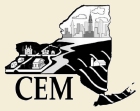Community Environmental Management or CEM is a multi-tiered initiative
that uses a variety of educational, assessment, technical and planning tools to
assist communities with addressing non-point source pollution and other related
environmental issues. Addressing these issues involves changing the way
communities think about, plan for and implement local programs/policies that
impact natural resources and water quality. The group or individual facilitating a
CEM initiative works to guide this change.
Many communities currently address environmental issues through a
variety of plans including: open space, natural resource, flooding, transportation,
water quality, comprehensive or master plans. But, there is often a lack of sound
technical expertise on environmental issues available to communities when
creating these plans. A CEM initiative can help fill in the gaps that often occur as
part of a regular planning process. The impetus for creating CEM comes from
various groups asking for guidance on how to impact this process. Every area
being unique, CEM uses a flexible and locally led approach.
CEM is designed to work on a range of geographic scales including site specific,
community, municipality or watershed. Municipal leaders, conservation
boards, planners/planning boards, water quality committees or concerned
landowners, can implement it. The overall objective is to establish effective local
programs for addressing specific community concerns.
|
